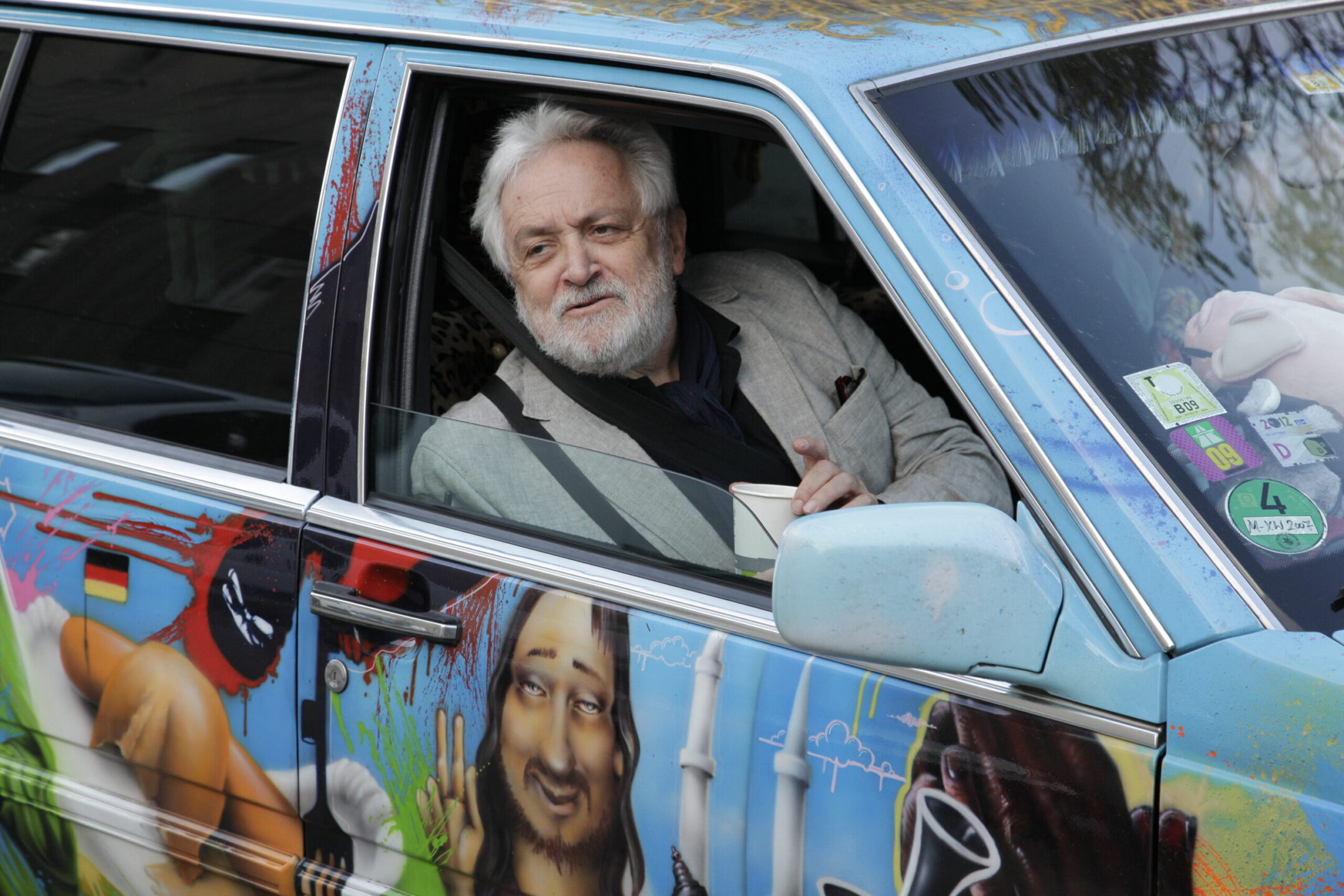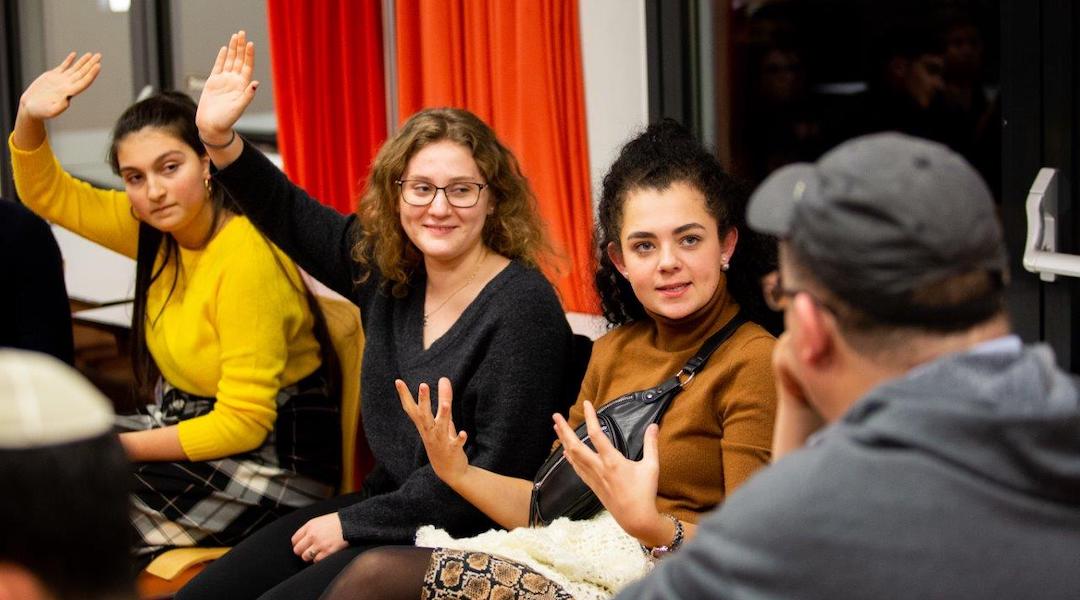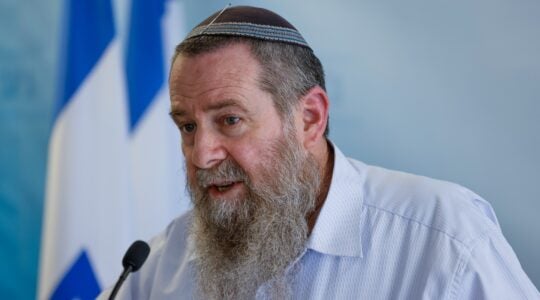BERLIN (JTA) – A retired teacher living in a tiny German island town has been promoting himself as a Jew under the mantle of an official program designed to introduce non-Jews to Jewish people and practices.
But Frank Borner is not part of the “Meet a Jew” initiative operated by the Central Council of Jews in Germany, the organization says.
In fact, there is no evidence that Borner is Jewish at all — and yet he has been offering a first-person perspective on being Jewish in Germany to audiences with few such opportunities, making comments sometimes smacking of antisemitism.
“The damage done by such charlatans to such an important project is great,” the Central Council said in a statement.
Borner appears to be another iteration of the “costume Jew” who advertises a false Jewish identity and builds a career or public persona around it. The phenomenon has long simmered in Germany, where Jewishness sometimes holds unusual fascination because of the Holocaust. It has become a public fixation this summer after a high-profile case emerged: that of Fabian Wolff, 33, a journalist who recently revealed that he is not actually Jewish after functioning for years as a Jewish frontman for left-wing Israel critics.
Unlike Wolff, Borner did not reveal himself. Instead, he was outed in the Die Welt newspaper in late July by two German journalists who attended a talk that Borner was delivering in the village of Petersdorf, on the island of Fehmarn. The journalists, Henryk Broder, who is Jewish, and Moritz Gerlach, raised concerns about inconsistencies, inaccuracies and gaps in Borner’s family story — and they noted that Borner invoked antisemitic stereotypes during his presentation.
For example, the journalists noted, Borner said his family emigrated to the United States after the war: to “New York and Hollywood, both full of Jews, firmly in Jewish hands.” According to their story, no one in the audience expressed surprise at this comment, which overlaps with antisemitic conspiracy theories about Jewish power.
Reached via email for a comment, Borner referred the Jewish Telegraphic Agency to the Gospel of Matthew in the Christian Bible: “Ye have heard that it hath been said, An eye for an eye, and a tooth for a tooth: But I say unto you, That ye resist not evil: but whosoever shall smite thee on thy right cheek, turn to him the other also.”
He later emailed an additional note. “During German fascism from 1933 to 1945, Germans hunted down Jewish fellow citizens,” he wrote. “In today’s Western democracy, Jewish people prey on other Jewish fellow human beings.”

The German Jewish journalist Henryk Broder, seen here in 2012, happened to be in the audience for a “Meet a Jew” presentation in Petersdorf auf Fehmarn, where he found the presenter’s story to be inconsistent. (Popow/ullstein bild via Getty Images)
Borner also told JTA that he and his family have never belonged to an official Jewish community in Germany, although he insisted that he has Jewish ancestry. “We have always belonged to a liberal-political Judaism,” he wrote.
The case highlights the role of Jews in the German popular imagination. “This is a widespread situation, especially in Germany, that people make themselves out to be Jews or see themselves as such, although they are not,” German Jewish historian Julius Schoeps said in a report last month about “Jewish fake identities and the question of ‘why’” on Deutschlandfunk radio.
“I just think it’s a syndrome, a syndrome that is deeply rooted in German society,” Schoeps said. “It’s a problem that has to do with people suffering from the past. And this problem can indeed take on strange forms.”
Masquerading as a Holocaust survivor or as someone with Holocaust trauma in the family is not limited to Germany. The phenomenon is sometimes called the Wilkomirski Syndrome, after the Swiss author whose 1995 best-selling “autobiography” about surviving the Holocaust turned out to be a fake.
In another notable case, the late German historian Sophie Hingst composed a family tree of Holocaust survivors and victims and even sent 22 pages of testimony for nonexistent people to Yad Vashem, Israel’s Holocaust memorial and archive, before Der Spiegel magazine revealed that she had a Protestant background. Hingst died by suicide four years ago, shortly after the magazine made her story public.
Journalist Kirsten Serup-Bildfeldt pointed out in the Deutschlandfunk report that many such cases involve individuals who feel guilt and shame over the Nazi past and desire to be identified with the morally correct side of history.
Among the sensational cases she mentioned, without identifying the people by name:
- The head of a small German Jewish community who resigned after Spiegel magazine published a story in 2018 that questioned his biography.
- A man who posed as a survivor and told his story to school groups, including the detail that his father died in the Buchenwald concentration camp — when in fact, his father was a soldier in the Nazi army.
- A woman who served as a Jewish community leader in a former East German city before German unification but whose claim to Jewish heritage was challenged.
- A vocal critic of Israel who claimed to be the child of survivors but had a regular German housewife mother and a father who was a Wehrmacht soldier.
“This biography was her way to get into the position of a supposed Jew in order to speak against Israel,” says Serup-Bildfeldt, who is not Jewish. “People who do this are doing enormous damage to the Jewish community. It is more of a psychological problem than a political one, but they also do political damage.”
In Borner’s case, the damage could come in the form of reinforcing antisemitic stereotypes at a time when they are seen to be on the rise. That trend is one reason that the Central Council of Jews in Germany launched the “Meet a Jew” initiative in 2020 and grew it to include 600 talks by 500 volunteers last year. The goal, the council said, was to shift attention away from the past.

The “Meet a Jew” project brings Jewish volunteers into classrooms to talk about their experiences. (Courtesy of Meet a Jew)
“Our idea is really to introduce modern-day Jewish life, and to give Jewish people a face and a voice,” Masha Schmerling, the program director at its launch, told JTA at the time.
Borner said little about contemporary Jewish life when he addressed groups twice in June at a citizens’ information center in the town of Petersdorf, saying, “Here on the island I am considered to be a Jew.” Broder and Gerlach were in the audience for the second session.
His talk focused on his family’s Holocaust history. In addition to his comments about Jewish control of Hollywood, Borner also repeated other antisemitic tropes. He said he was interested in “why the Jews went to the slaughter like sheep,” saying, “Why did the Jews do that? They were people with money, with international connections!” according to the Die Welt report.
Borner also reportedly said that there was a special Jewish “capacity for suffering” connected with the “victim role” that clung to Jews “archetypically, like primordial slime.”
The journalists wrote that the audience “neither questions nor disagrees” when Borner refers to Hollywood and “listens in silence” as he discusses Jewish victimhood.
For Broder and Gerlach, red flags flew as Borner told his story. When speaking about the anti-Jewish pogrom of November 1938, Borner described its orchestrator — Nazi propaganda minister Joseph Goebbels — as “a philologist with a PhD who wrote very beautiful poetry.” The pogrom was “the first central experience for our family,” said Borner, adding that his grandfather — a doctor — was taken by surprise, even though one of his patients had warned him.

The German island of Fehmarn is home to vacation colonies and one man who is publicly advertising himself as a Jew despite not having any evidence to support his story. (Frank Molter/picture alliance via Getty Images)
As the Die Welt story points out, Jewish doctors were not allowed to have non-Jewish patients after the summer of 1938.
The question of whether Borner has any Jewish roots remains unanswered. He insists that he does, but he refused to say where his supposedly Jewish side of his family had lived and provided only sketchy details about their persecution under the Nazis.
When the journalists asked where Borner’s Jewish family had lived, “he disposed of the question in the trash bin of history, with one sentence: ‘I don’t wish to say that now.’”
The Die Welt story identified three different stories that Borner had offered about his grandfather’s fate. At the “Meet a Jew” event Borner said he had been beaten to death during the Kristallnacht pogrom, known in Germany as Reichspogromnacht. In a Facebook post, Borner said his entire family survived the war because they fled the country. Finally, Borner told the Lübecker Nachrichten newspaper that his grandfather committed suicide in a concentration camp.
Relatives contacted the newspaper later and told them the story was not true, according to the Die Welt report.
How Borner ended up back in Germany remained a mystery in his “Meet a Jew” talk, where he said he had been to Israel a few times with his parents, in the early 1950s. “Which is kind of astonishing,” the Die Welt article said, “since he said he was born in 1956.”
JTA has documented Jewish history in real-time for over a century. Keep our journalism strong by joining us in supporting independent, award-winning reporting.






